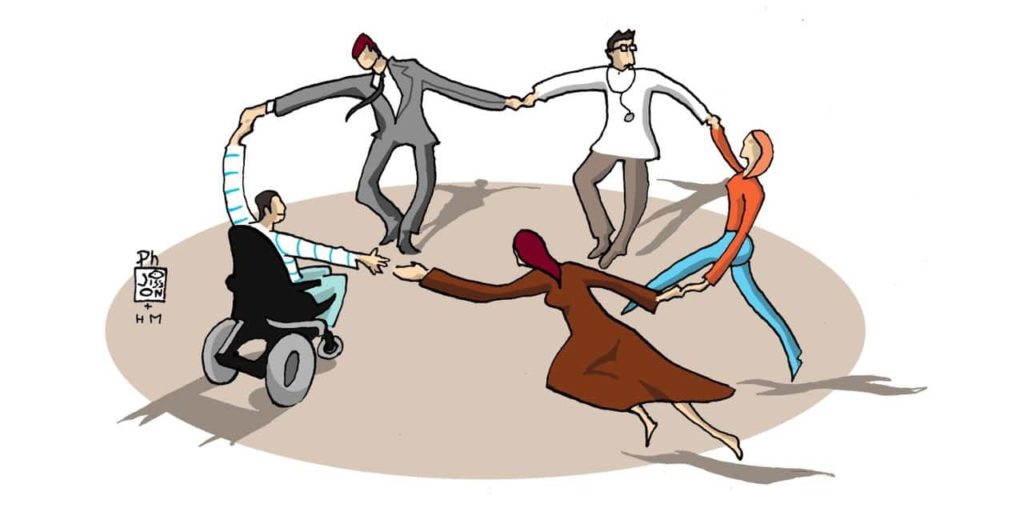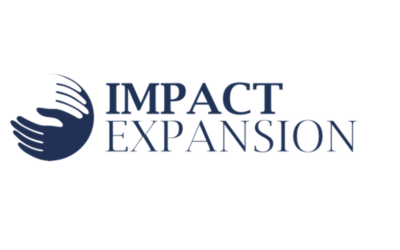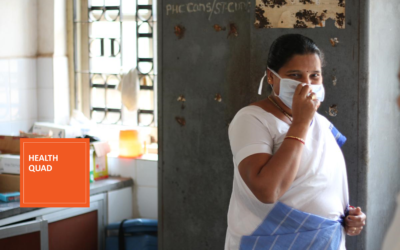This article is available in French on the website of La LibreLa Libre , one of Belgium’s main newspaper. It is an opinion piece from François de Borchgrave, co-founder of KOIS and President of the non-profit Tous Ensemble Handicap.
Picture is courtesy of La Libre.
My son was born in 2013, after a perfect pregnancy and a normal delivery. Apart from his mother’s “death” screams because we couldn’t find the person called for the epidural, and apart from my nervous laughter in echo of those, nothing to report.
Back in the room, the panic strikes as he turns blue on his mother’s chest. Igor is taken directly to the neonatology unit. That’s where he spent the first ten days of his life: he stopped breathing several times a day, without catching his breath. Repeated resuscitations under the worried gaze of his young parents. Day after day, several times a day, living that moment when we didn’t know whether he would come to the surface, catch his breath or let himself slide into eternity. The efforts of the doctors brought him back to us each time.
Life with a disabled child
After ten days, under the reassuring gaze of the nursing staff, we went home with him, to join his older sister. Everything would be fine now.
And then it wasn’t. One evening, he had spasms. Back to the hospital. Diagnosis: West’s syndrome (newborn’s epileptic form of undetermined origin). On the Internet, there is a lot of information, even if everything is very vague: but the scenarios are not pleasant. He will probably be severely disabled. Verdict that one takes it like a hammer in the belly, which shatters into pieces the projected images of happiness that one should have at that moment.
And begins life with a disabled child.
Very few happy moments in the very first years of his life. Lots of hospital visits, appointments with specialists, gurus, voodoos – you hold on to everything, but you remain worried and uncertain. No night without multiple awakenings, no season without recurring illnesses, so few moments of smiles.
In all sincerity, there was a time when I resented the doctors. Why so much relentlessness during neonatal care? Why had we tried so hard to keep among us this child who seemed unable or unwilling to be with us? Why couldn’t we let Mother Nature have the freedom of the plan she had defined for him?
Igor, today
Igor is now 7 and a half years old.
He doesn’t talk, doesn’t walk. He is dependent on everything he does: eating, drinking, getting dressed. Moving around. Playing.
But he has become a very happy child. So communicative through his eyes, through the expressions on his face. A smile, a little pout from his mouth and he disarms you. An inveterate food-lover, enjoying chocolate mousse, straciatella ice cream, devouring mangoes and raspberries. A deep sleeper, so happy to be back in bed after a busy day. A child who loves to go on adventures, singing when we leave the house for a walk. Ready for anything, to go jumping in a bouncy castle or on a trampoline, to go swinging, to go stroking horses…
He revealed himself.
And he has also revealed all those around him.
He revealed his mother, first of all, who rose up from this life’s right-hook by embracing life itself.
He revealed his sister, despite my deepest fears about the difficulties for a sibling to have a brother that is different. I am so proud of her ! How she loves him, from the height of her 9 years old. How she rushes in the morning to be the first one in his room. How she treats and mistreats him, as if he had been a “normal” little brother.

He is like us
He revealed my mother and father, quick from the beginning to take care of him at all hours, to spoil him, to include him in the activities of the other grandchildren. What a smile on his face when he hears their voices on the phone or when we come to their house.
He made me see how in the end many limitations are only limitations set by our own beliefs. In the end, there is nothing that this child cannot do like the rest of the family: he skis when his sister skis, he goes surfing when she learns to ride the waves, he rides horses, swims, does zip lines, swallows kilos of candy, etc. He has a lot of fun with the other grandchildren. Of course, each time with minor or often significant adaptations, but in the end he does the same thing as those around him. In his own way, he is like his sister, he is like us.
Above all, he allowed me to see that even the most different elements are essential in society. They are essential so that we can measure ourselves against what is important: how to make room for everyone, no matter what the differences. I am now a thousand miles away from those years when I cursed those neonatal doctors for their relentlessness. What a gift to have Igor by my side. How I miss his smile when he’s half the week at his mother’s house. What infinite love I have for this child. How proud I am of the father and the human he has made me.
Finally, people like Igor say a lot about this society we live in. They reveal us as human beings. What place do we make for the one who is different?
What will happen?
As a child, Igor is always well taken care of during the day by specialised institutions. These are places of light. I am impressed by the staff of these schools. What energy, what love, what talent to make the eyes of these so limited children shine.
However, a big difference remains: as an adult, my son will not go off to make his own life. And in the minds of his mother and me, a big question arises: what will happen the day we are too old to take care of him? What will happen when we are no longer there?
In Belgium, there are unfortunately too few places in centers, especially for disabled adults with high dependency like my son.
And above all, there are too few places in homes that allow these disabled people who have become adults to live a life in as much normality as possible, in contact with society. Too often, in fact, centers for disabled adults are in places far from everything, with a concentration of a large number of residents.
It is essential to develop new places to live for these disabled adults, and to create them on a human scale, among us, close to the activities offered by life in the city, in the village.
It is essential to integrate the inhabitants of these centers in our daily lives, and that these centers are also meeting places where we go to them. In this way, we will offer them a future worthy of the name, and, I am convinced, we will offer a future to our humanity.
This text is dedicated to all those who contribute to it…
About the author
François de Borchgrave is a co-founder of KOIS, and president of the non-profit Tous Ensemble Handicap. Tous Ensemble Handicap aims to open an inclusive center for disabled adults in Brussels by 2024. If you wish to contribute, please visit: http://bit.ly/33DwCq5.




